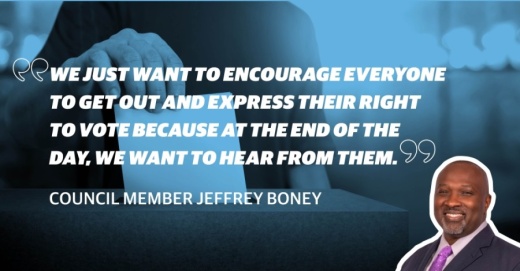Council Member Jeffrey Boney said the charter amendments proposed this election cycle would bring the city’s charter up to date and strengthen the city's governance.
“Many of the things that you see as amendments that will be on this ballot for May are just to shore up our infrastructure and make sure that we have all of our ducks in a row in a way that we can know without a shadow of a doubt ... that there’s transparency and there’s accountability,” Boney said.
Two amendments on the ballot, which were discussed at length by the Missouri City Charter Review Commission, pertain to extending the length of a City Council term from two years to three years and limiting the number of consecutive years a council member can serve to 12 years.
Changing the charter
The review commission, which is made up of five Missouri City residents, meets every four years to inspect the charter and assess possible updates, said Joe Workman, a former City Council member who chaired the most recent commission.
“The charter review commission is simply somebody to sit down and kind of review the charter, look at things that might have changed over the years, the way the world is changing and the way the Texas Legislature [has changed],” Workman said.
The commission brought six proposed amendments for this year's election to council, which added three of its own earlier this year.
Council Member Vashaundra Edwards, for one, expressed opposition to this amendment and said she felt it was an attack against former Mayor Yolanda Ford.
Proposition B would clarify that those selected for the mayor pro tem position—which is voted on by council—will serve a one-year term.
Proposition C would dictate that the city manager seek approval from a majority of council before appointing, suspending or removing a department director. Proposition D would require the city manager’s contract and compensation to come before council.
“I believe that these amendments are our quality amendments that will help ... maintain that balance of power that is split between it being a council-manager form of government versus a strong-mayor form of government,” Boney said.
Council Member Floyd Emery said Proposition D was a reaction to the feeling held by several council members that they should have been more involved in the contract negotiation process with City Manager Odis Jones instead of having that conversation be dominated by Ford.
Jones said it is common practice for the city manager’s contract to go before council. However, he said it is unorthodox in a council-manager form of government for hiring the city’s executive team not to be fully within the city manager's purview.
“Notwithstanding, as the city manager, I respect the will of the voters and the electorate and I am excited to carry forth the duties as they so please,” Jones said in an email.
Proposition E would extend council members’ terms from two years to three years, which Council Member Floyd Emery said would help new members better acclimate to serving on council.
“When I first came in for a two-year term, the first year that you’re in, you’re basically trying to learn the workings of the city—what’s required of a councilperson,” Emery said. “As soon as that happens, then, you’re right into the next year, and you start the campaigning process.”
Proposition F would limit the number of consecutive years someone can serve on council to 12 years before a mandated two-year break, after which they would have a chance to be elected back to the council.
If approved, Propositions E and F would go into effect for the upcoming November election.
Propositions G and H are budget-oriented, and as such, Workman said, they would have little effect on the public.
Proposition I would move the timeline for appointments to the charter review commission from July to January. Workman said the commission was appointed last July and made charter recommendations to council in November 2020, too late for the amendments to be on November’s ballot. Proposition I would allow for future amendments to be placed on a ballot in November, which is when voters cast ballots for council positions.
Turning out to vote
The charter amendments, along with the Fort Bend ISD board of trustees positions, will be the only things on Missouri City residents’ May ballot.
During the last charter amendment election, which took place in November 2017—an off year in terms of presidential and midterm elections—6.9% of registered voters in the City turned out, according to data from Fort Bend County.
Boney said he encourages residents to be engaged at the local level.
“We have a great city,” Boney said. “I think it's a matter of people who are engaged in the community, who understand the importance of voting, that will show up to the polls as they always do, and hopefully, we'll have more that are encouraged to do [so].”
Workman said the charter amendment election is a way for residents to express their opinions on the way they would like the city to be managed.
“The city charter is just like the Constitution,” he said. “It governs everything the city can do and how the city is managed and how people are elected and all that good stuff. It’s important that people take an active position in making sure that the ‘Constitution’ ... is what they want it to be.”





